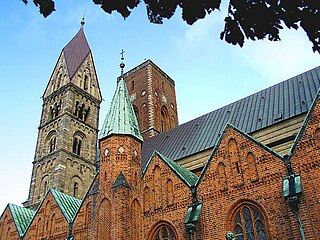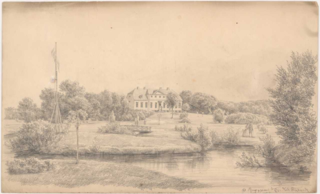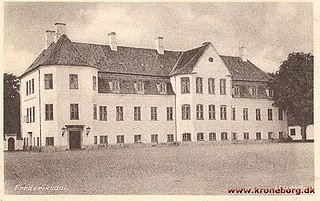
Frederick IV was King of Denmark and Norway from 1699 until his death. Frederick was the son of Christian V of Denmark-Norway and his wife Charlotte Amalie of Hesse-Kassel.

The Danish East India Company refers to two separate Danish-Norwegian chartered companies. The first company operated between 1616 and 1650. The second company existed between 1670 and 1729, however, in 1730 it was re-founded as the Asiatic Company.
Stephan Hansen Stephanius was a Danish historian and philologist. His name is sometimes fully Latinized as "Stephanus Johannis Stephanius"

Anders Sørensen Vedel was a Danish priest and historian. He translated the Gesta Danorum by Saxo Grammaticus into Danish in 1575, and published the influential "Hundredvisebogen" in 1591.

Sophie of Mecklenburg-Güstrow was Queen of Denmark and Norway by marriage to Frederick II of Denmark. She was the mother of King Christian IV of Denmark and Anne of Denmark. She was Regent of Schleswig-Holstein from 1590 to 1594.

The Diocese of Ribe is a diocese within the Church of Denmark. Ribe Cathedral serves as the central cathedral within the diocese. Since 2014, the bishop has been Elof Westergaard.

Johan Isaaksz Pontanus was a Dutch historiographer.
Povel Ottesen Huitfeldt was the first Danish-Norwegian Governor-general of Norway.

Skiklubben Ull was a Norwegian Nordic skiing club based in Oslo. Founded in 1883, Skiklubben Ull attracted several skilled sportsmen who between 1883 and 1891 won six Ladies' Cups and one King's Cup in national skiing events. The sporting facilities belonging the club were located in Vestre Aker, with the ski jumping hill Ullbakken near Frognerseteren being opened in 1884. The prestigious Husebyrennet was staged there once. Members of SK Ull were later instrumental in moving this prestigious contest to the hill Holmenkollbakken.
Events from the 1570s in Denmark.
Court Mistress or Chief Court Mistress is or was the title of the senior lady-in-waiting in the courts of Austria, Denmark, Norway, the Netherlands, Sweden, Imperial Russia, and the German princely and royal courts.

Christianssæde is a manor house and estate located close to Maribo on the island of Lolland in southeastern Denmark.
Caspar is a masculine given name. It may refer to:
Danish shipbuilders in the Age of Sail
This list, arranged by year, presents builders of Danish warships from the late 17th century to mid-19th century. It names the Heads of Naval Construction (Fabrikmester) and includes lesser shipbuilders to the Danish Royal Navy. It does not include purely commercial shipbuilders.

Bjergbygaard is a manor house and estate located at Holbæk, Denmark.
Knud Nielsen Benstrup was a Danish naval officer and the senior officer, overfabrikmester, at the Royal Danish naval shipyards, until his career was blighted by court martial and imprisonment.

Frederiksdal is a manor house and estate located 10 km northwest of Nakskov on Lolland, in southeastern Denmark. The estate covers 538 hectares of land. It is known for its fortified cherry wine.

Kjærstrup, or Kærstrup, is a manor house and estate located 9 kilometres East of Rødbyon Lolland, Lolland Municipality, in Southeastern Denmark. The two-storey, half-timbered main building was faced with brick in 1836 and a central tower in the front was added in 1868. The building was listed on the Danish registry of protected buildings and places in 1918. The adjacent farm buildings date from the early 1910s and are not part of the heritage listing. A Baroque style garden from around 1765 was restored in around 1900. The estate covers 487 hectares of land.
Rasmus Krag (1680–1755) was a Danish naval officer who first became a junior lieutenant in 1700 and vice-admiral in 1736. He aspired to be a naval architect but his efforts proved unsatisfactory.










